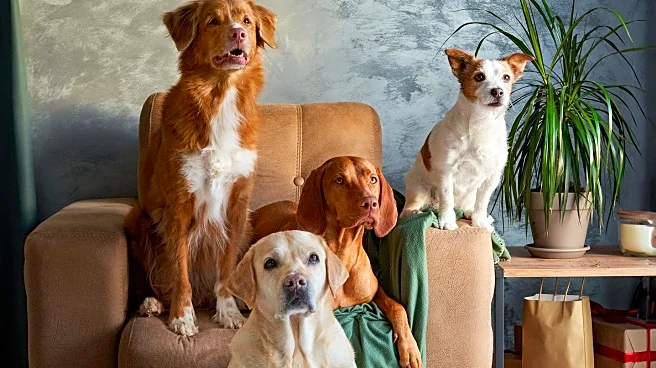What is the story about?
What's Happening?
A viral TikTok video has captured the attention of viewers as a woman checks on her dogs, Bentley and Prada, in their bedroom at 1 a.m. The footage shows the dogs sleeping in a room decorated with a Bluey theme, reflecting the owner's dedication to providing a comfortable and joyful space for her pets. Bentley, an 8-year-old rescue dog, and Prada, a younger pup, have bonded closely, becoming integral members of the family. The owner, a stay-at-home property manager, has embraced the trend of 'barkitecture,' where pet owners create dedicated spaces for their animals, complete with custom beds and themed decorations.
Why It's Important?
The trend of creating dedicated rooms for pets, known as 'barkitecture,' signifies a cultural shift in how pets are perceived and treated within families. This movement reflects the growing importance of pets as family members, with owners investing in personalized spaces that cater to their pets' comfort and happiness. The viral video underscores the emotional connection between humans and their pets, highlighting the lengths to which owners will go to ensure their pets' well-being. This trend may influence the pet industry, encouraging businesses to offer more specialized products and services tailored to pet owners seeking to enhance their pets' living environments.
What's Next?
As the trend of 'barkitecture' continues to gain popularity, it is likely that more pet owners will adopt similar practices, leading to increased demand for pet-friendly home designs and products. Companies in the pet industry may respond by expanding their offerings to include more customizable and themed pet furniture and accessories. Additionally, social media platforms like TikTok may continue to play a role in showcasing innovative pet care ideas, inspiring others to create unique spaces for their pets. This could lead to further integration of pets into family life, influencing housing design and consumer behavior.
Beyond the Headlines
The rise of 'barkitecture' may also have ethical implications, as it challenges traditional views on pet ownership and care. By treating pets as family members, owners may advocate for improved animal welfare standards and push for legislative changes that protect pets' rights. This cultural shift could lead to broader discussions about the responsibilities of pet ownership and the importance of providing environments that promote animal well-being. As pets become more integrated into family life, societal attitudes towards animals may evolve, fostering greater empathy and understanding of their needs.


















